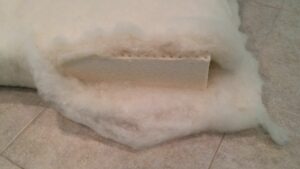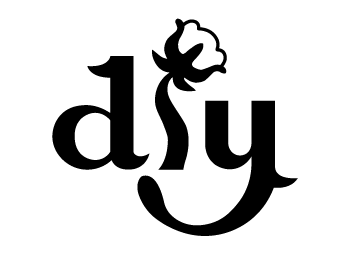
Wool batting is a sheet of wool fibers, aligned and layered in sheer sheets on top of each other, over and over until the batt’s desired weight is achieved. A wool batting wrap around latex both is used both when making couch cushions and when making a mattress. Here’s why.
SOFTENING
Latex is bouncy. It has a nice rebound to it that keeps body impressions from lasting like they do in memory foam. Wool does not have a bounce. Much of our wool has a crimp to it, which gives it strength and body. A layer or two of wool softens the bounce of the latex and moderates the sponginess feel of the foam. It also smooths out the edges of the foam for a slightly rounded look.
In a way, the wool is considered a pillowtop to the latex, especially if 2 or 3 layers are used. I usually compare our wool toppers to a medium piece of latex, which would be soft for a couch cushions.
PLUMPING
Wool batting is used to add some puff to your cushion. Sometimes this is an even layer around, sometimes the batting is folded in a pyramid of layers on the top and bottom of the cushions to add a little extra height there and give a rounded look to the cushion.
As I say in the post How to choose Firmness for Couch Cushions #4, all fabric has stretch to it, even a woven fabric like a twill has a slight stretch to it. Think of the way a pair of jeans fits snugly fresh out of the dryer, yet loosely when they go into the washing machine. Another trick besides cutting the latex a 1/2″ larger, is to wrap the latex in the wool batting. If the case and the latex are made the same size, adding in a 1/2″ a wool batting wrap will provide that the case will still look full after it has stretched its 3%.
METHOD
If you ask us to wrap a latex cushion in batting, we neither staple it, sew it or glue it. We merely wrap it around the latex and let time do the work of adhering the batting to the latex. The wool fibers will twist in to the latex in about 3 months, leaving it gripping the latex. Wool batting is not sticky like Dacron batting would be, so even without an inner case, the latex wrapped in wool will slip into the outer case easily. The batting still may be removed if desired, but it will leave behind small fibers in the latex.
SHAPE
How you wrap the organic latex cushion is up to you. Some choose to wrap the entire piece of foam, top and bottom, front and back, sides. Some choose to wrap just the noticeable areas, the front, the top and bottom. This minimal wrap focuses the batting where it will be most useful. It is called a bookwrap.
If plumping the cushion is specifically your goal, consider layering multiple pieces of the top of the cushion. If the cushion is flippable, do the bottom as well. Layer the batting in a pyramid style with 3-4 wool pieces gradually getting smaller so that you can target the area of plumpness.
While you will probably the wool in pieces, consider “tearing the wool” by pilling apart the fibers. Then tease the edges so that appearance of the wool is gradual instead of a sharp distinction. Tease the edges by pulling the fibers apart so that some are longer and the entire edge tapers.
DIY WRAPPING
We let you participate in your project by cutting the batting and wrapping it around the latex yourself. We will provide you with cutting maps so that you need to do no number work, no figuring, all you need is scissors and a space to work in. After the cushion is wrapped in the wool, stuff it in your case and zip it shut. Simple.

This wool batting wrap is such a cozy and versatile option – perfect for keeping warm on chilly days or adding some extra comfort to your home decor!
For a futon mattress, would it be better to sew the wool, to prevent it from sliding down while upward in the couch position?